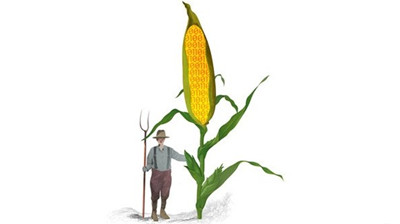熊彼特
Digital disruption on the farm
農場上的數據化顛覆
Managers in the most traditional of industries distrust a promising new technology
最為傳統的行業管理者們對前景光明的新技術疑慮重重
INNOVATION is a word that brings to mind small, nimble startups doing clever things with cutting-edge technology. But it is also vital in large, long-established industries—and they do not come much larger or older than agriculture. Farmers can be among the most hidebound of managers, so it is no surprise that they are nervous about a new idea called prescriptive planting, which is set to disrupt their business. In essence, it is a system that tells them with great precision which seeds to plant and how to cultivate them in each patch of land. It could be the biggest change to agriculture in rich countries since genetically modified crops. And it is proving nearly as controversial, since it raises profound questions about who owns the information on which the service is based. It also plunges stick-in-the-mud farmers into an unfamiliar world of “big data” and privacy battles.
說起創新,人們往往會想到那些規模較小,經營靈活的初創企業運用前沿技術來做聰明透頂的事兒。不過,對于那些規模龐大,歷史悠久的行業來講,創新也是同樣重要。農業正是這類行業的典型。農民可謂是最頑固的管理者—也就難怪他們對規范性種植這種注定顛覆舊有業務的新概念會疑慮重重。實質上,這個系統在指導農民針對不同土地種植相應作物上擁有極高精確度。在那些富裕國家中,這可謂是自轉基因作物之后的最大變革,但也同樣充滿爭議,因為這其中有一個深刻的問題亟待解答:究竟誰應持有這項服務賴以生存的信息?這項技術同時也迫使一向循規蹈矩的農民進入充滿了“大數據”和隱私權爭議的陌生世界。
Monsanto's prescriptive-planting system, FieldScripts, had its first trials last year and is now on sale in four American states. Its story begins in 2006 with a Silicon Valley startup, the Climate Corporation. Set up by two former Google employees, it used remote sensing and other cartographic techniques to map every field in America (all 25m of them) and superimpose on that all the climate information that it could find. By 2010 its database contained 150 billion soil observations and 10 trillion weather-simulation points.
孟山都一項名為“FieldScript”的規范性種植系統在去年實行了第一次試驗,該系統如今已經在美國的四個州開始銷售。這一切還得從2006年在硅谷由兩位谷歌前雇員成立的一家名為氣候公司的初創企業說起。此公司運用了遙感和其他制圖技術將美國的每片土地都描繪了下來,并且在其上又疊加了一切可用的氣候信息。截至2010年,它的數據庫涵蓋了1500億土壤觀測數據,以及十萬億天氣仿真數據。

The Climate Corporation planned to use these data to sell crop insurance. But last October Monsanto bought the company for about 1 billion—one of the biggest takeovers of a data firm yet seen. Monsanto, the world's largest hybrid-seed producer, has a library of hundreds of thousands of seeds, and terabytes of data on their yields. By adding these to the Climate Corporation's soil- and-weather database, it produced a map of America which says which seed grows best in which field, under what conditions.
氣候公司原本打算依靠這些數據來出售農作物保險。但是去年十月份孟山都以10億美元的價格收購了該公司—這可謂是史上最大規模的數據公司收購交易。孟山都是世界上最大的雜交種子生產商,擁有幾十萬類型的種子庫,還有達一百萬兆規模的產量數據。把這些信息和氣候公司的土壤天氣數據結合,就會得到一個信息豐富的美國地圖,你可以在上面看出不同種類的種子在什么地段、什么條件下長勢最好。
FieldScripts uses all these data to run machines made by Precision Planting, a company Monsanto bought in 2012, which makes seed drills and other devices pulled along behind tractors. Planters have changed radically since they were simple boxes that pushed seeds into the soil at fixed intervals. Some now steer themselves using GPS. Monsanto's, loaded with data, can plant a field with different varieties at different depths and spacings, varying all this according to the weather. It is as if a farmer can know each of his plants by name.
FieldScripts 使用所有的這些數據來運行由Precusion Planting制造的設備。該公司在2012年被孟山都收購,專門制造位于拖拉機后部,同步運行的播種機和其他設備。比起原先簡陋的盒子結構和等間距播種功能,到如今播種機已經發生了翻天覆地的變化。其中一些能夠利用GPS來引導自己。孟山都的產品經過數據加載,能夠根據天氣的變化進行不同深度、不同間距以及不同品種的播種活動。其準確程度很高,如同一位農夫能將各個作物熟記于心。
Prescriptive planting is catching on fast. Last November another seed producer, Du Pont Pioneer, linked up with a farm-machinery maker, John Deere, to beam advice on seeds and fertilisers to farmers in the field. A farm-supply co-operative, Land O'Lakes, bought Geosys, a satellite-imaging company, in December 2013, to boost its farm-data business.
規范性種植正在迎頭趕上。去年十一月份,另一個種子生產商杜邦先鋒同農場機械制造商約翰迪爾聯手給農民提供種子和化肥方面的指導。名為“Land O'Lakes農場供應合作社于2013年12月收購了衛星成像公司Geosys以提高其農場的數據業務。
The benefits are clear. Farmers who have tried Monsanto's system say it has pushed up yields by roughly 5% over two years, a feat no other single intervention could match. The seed companies think providing more data to farmers could increase America's maize yield from 160 bushels an acre to 200 bushels—giving a terrific boost to growers' meagre margins.
其中的好處顯而易見。那些試用過孟山都系統的農民交口稱贊,聲稱過去兩年的產量因此而上升了5%左右,這一成就無可匹敵。種子公司認為給農民提供更多的數據能夠把美國的玉米產量從160蒲式耳每英畝( 10噸每公頃)增加至200蒲式耳—這對于一向薄利的農民來說是個大好消息。
But the story of prescriptive planting is also a cautionary tale about the conflicts that arise when data entrepreneurs meet old-fashioned businessfolk. Farmers might be expected to have mixed feelings about the technology anyway: although it boosts yields, it reduces the role of discretion and skill in farming—their core competence. However, the bigger problem is that farmers distrust the companies peddling this new method. They fear that the stream of detailed data they are providing on their harvests might be misused. Their commercial secrets could be sold, or leak to rival farmers; the prescriptive-planting firms might even use the data to buy underperforming farms and run them in competition with the farmers; or the companies could use the highly sensitive data on harvests to trade on the commodity markets, to the detriment of farmers who sell into those markets.
不過,當熟識數據的企業家們遇上傳統的生意人,規范性種植這一傳奇也會因其中的火藥味變得扣人心弦。農民們對于這項技術本來就是喜憂參半:雖然產量有所提高,但是這卻使得他們的核心競爭力—用于種植的判斷力和技藝變得無足輕重了。不過,更大的問題是農民對于兜售這項新技術的不信任。他們擔心自己所提供的收成的詳細數據可能會被濫用。他們的商業機密可能會被出售、或者泄露給競爭對手;這些指令種植企業甚至可能利用這些信息去收購那些表現欠佳的 農場,使其成為不可忽視的競爭勢力;它們還有可能利用這些高度敏感的數據在大宗期貨市場上交易,從而給在此市場中作為賣方的農民造成損失。
Looking a gift horse in the mouth
吹毛求疵
In response to such worries, the American Farm Bureau, the country's largest organisation of farmers and ranchers, is drawing up a code of conduct, saying that farmers own and control their data; that companies may not use the information except for the purpose for which it was given; and that they must not sell or give it to third parties. The companies agree with those principles, though so far their contracts with farmers do not always embody them. Also, once data have been sent and anonymised, farmers might be said no longer to own them, so it is not clear what rights to them they still have. For this reason and others, some Texan farmers have banded together to form the Grower Information Services Co-operative, to negotiate with the data providers.
為了安撫農民的擔憂,作為全國最大的農牧場主組織的美國農場局正在起草一項行為守則,使農民對他們的數據有擁有權和控制權,那些規范性種植公司僅能把數據用于初衷,而且不能夠把數據出售或者贈與第三方。公司們紛紛表示同意遵守,但是到目前為止,這些原則卻并沒有體現在和農民簽訂的合同中。此外,一旦數據被出售并且匿去原有者名字,農民們可能就不再享有所有權,那么對于其他權利的討論就會變得模糊。由于這種種的原因,一些德州農民聯合成立了種植者信息服務合作社以同數據提供者們進行談判。
Another worry is that, since the companies have not yet made the data fully “portable”, farmers may become locked into doing business with a single provider. To assuage all these concerns, the Climate Corporation has set up a free data-storage service for farmers, which others cannot access without the farmers' permission. New niche data-management firms are entering the market, which should help make it more competitive.
另外使人擔心的則是由于這些公司還未使數據完全“便攜化”,農民們可能只能和單一供應商進行交易。為解決此問題,氣候公司已經為農民建立了免費的數據存儲服務,訪問者必須具有農民的授權。新的利基數據管理公司正在紛紛涌入市場,從而使其擁有更多的 競爭性。
For the time being, though, the biggest companies will dominate prescriptive planting. They collect the most comprehensive data and make better use of them than anyone else. And that raises a problem which affects big data in all its forms. Prescriptive planting could boost yields everywhere, just as mass, anonymised patient records could improve health care. But its success depends on service providers persuading users (farmers or patients) to trust them. If the users think they are taking a disproportionate share of the risks while firms are getting an excessive chunk of the benefits, trust will remain in short supply.
不過就目前看來,最大的幾家公司將主導規范性種植市場。比起其他任何公司,他們將有能力收集最為全面的數據,并且能更好的利用這些數據。而這將會引起足以影響所有形式的大數據的問題。如同大量匿名病人的記錄能夠改善醫療保健系統一樣,規范性種植也將提高各地產量。然而此舉能否成功將依賴于服務供應商能夠說服用戶以建立信任關系。如果使用者認為自己所負擔的風險大得不成比例,而供應商們得到了太多好處,那么信任關系很難成立。












